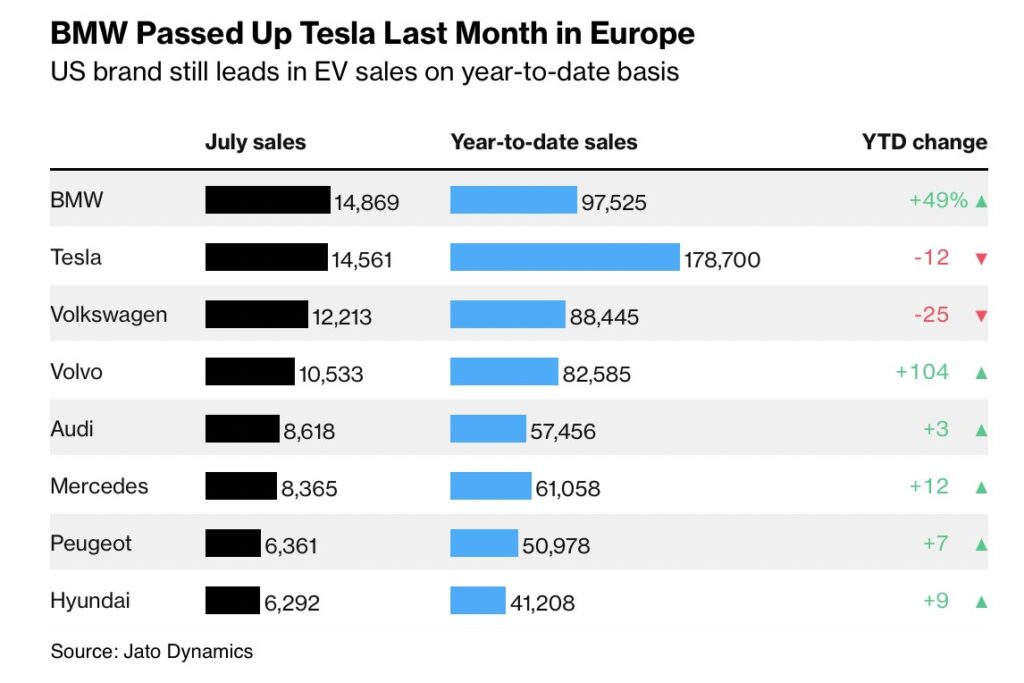BMW Surpasses Tesla in European EV Sales: A Shift in the Market
The electric vehicle (EV) market in Europe has taken a surprising turn this past month. For the first time, **BMW has outsold Tesla** in the European Union. Despite Tesla’s year-to-date (YTD) sales remaining significantly higher, this shift marks a pivotal moment in the competition between traditional car manufacturers and new-age electric vehicle companies.
The Rise of BMW in the European EV Market
BMW’s recent success in the European EV market is a result of strategic planning and timely execution. The German automaker has ramped up its production capabilities and introduced new electric models that have resonated well with European consumers. The BMW iX3 and i4 have been particularly well-received, combining traditional BMW luxury with cutting-edge electric technology.
In contrast, Tesla faced a few hiccups, including supply chain disruptions and delays in the delivery of its new models. These factors contributed to BMW edging out Tesla in monthly sales, although Tesla’s overall YTD figures still paint a dominant picture.
Consumer Preferences and Market Trends
The European market has shown a notable shift in consumer preferences towards electric vehicles. While Tesla has long been the frontrunner, the demand for variety and traditional automotive assurance has given BMW an edge. Many consumers appreciate the familiarity and reliability associated with established brands like BMW, which have been household names for decades.
Additionally, European consumers are increasingly drawn to brands that offer a diverse lineup of vehicles, catering to various needs and preferences, from luxury sedans to compact SUVs.
Challenges and Opportunities Ahead for Tesla

Despite this recent setback, Tesla remains a formidable player in the EV market. The company’s YTD sales are still significantly higher, underscoring its strong market presence. However, to maintain its lead, Tesla needs to address several challenges:
- Supply Chain Optimization: Tesla must streamline its supply chain processes to avoid future disruptions.
- Expanding Model Range: Introducing new models that cater to a broader audience will help retain and attract more customers.
- Enhancing Customer Service: As competition grows, providing exceptional customer service can be a differentiating factor.
Opportunities abound as well; Europe is a burgeoning market for electric vehicles, with governments offering incentives for EV purchases and investing in charging infrastructure. Tesla can leverage its strong brand reputation and innovative edge to capture further market share.
The Broader Impact on the EV Industry
This development could have broader implications for the EV industry. It demonstrates that traditional automakers are catching up and making significant inroads in the electric vehicle space. This healthy competition could spur further innovation, faster technological advancements, and ultimately, more choices for consumers. The competition between BMW and Tesla is just one facet of a rapidly evolving industry that promises to redefine transportation in the 21st century.
For consumers, this is an exciting time. The growing variety of electric vehicles available means more choices, better technology, and potentially more competitive pricing as companies vie for market share. The ultimate winners will be the consumers who benefit from the advancements driven by this competition.
Looking Forward
As we look towards the future, the competition between BMW and Tesla will most likely intensify. Both companies are set to release new models and technologies that could further shift market dynamics. For now, BMW’s recent victory marks a notable point in the ongoing battle between traditional automotive giants and electric vehicle pioneers.
The European EV market is poised for exciting developments, and this recent shift in sales may just be the beginning of a new chapter in automotive history.
